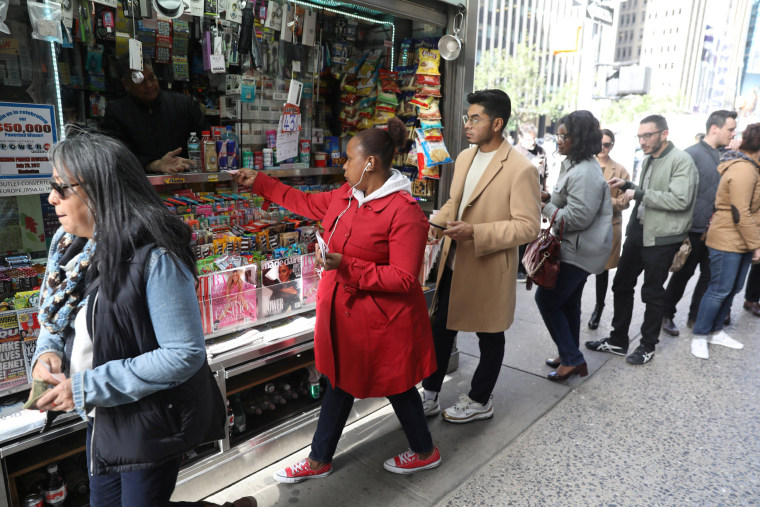With the nation in a frenzy over the record $1.6 billion Mega Millions jackpot, addiction experts have advice for compulsive gamblers: Now, more than ever, is a good time to reach out for help.
The excitement over the jaw-dropping grand prize — along with a Powerball jackpot that has climbed to $620 million — is harmless fun for many people. But for those who have struggled with gambling addiction, the lottery fever can be a trigger.
"For people in recovery, this can be an amazingly difficult time, because there are constant reminders to play," said Keith Whyte, executive director of the National Council on Problem Gambling, which operates the National Problem Gambling Helpline (1-800-522-4700), a round-the-clock phone, text and chat hotline. "Many of them feel like they're just one bet away from winning everything back."
And for those who are active in their gambling addiction, hearing everyone else talk about buying tickets can make it more tempting to play big themselves.
"It can be similar to a drinking problem on New Year's Eve. There's a lot of potential triggers," Whyte said. "It's a really bad idea to try to gamble more to try to gain back what you've lost, but that's a problem we see — chasing what you've lost."
At least 6 million Americans are problem gamblers, according to the nonprofit National Council on Problem Gambling. Last year, the National Problem Gambling Helpline received 233,000 calls, an average of one call every two minutes; Whyte said that whenever there is a high jackpot, there is typically a 25 percent spike in call volume, although the help line does not have precise statistics yet on what the uptick has been this month.
Compulsive gambling shares some characteristics of other addictions — compulsive gamblers are just as powerless over their addiction as drug addicts are — but experts say it differs in a key way.
"Since gambling addiction is a psychological addiction, there's no substance, nothing you take or eat or drink" and get physically addicted to, said Uberto Mondolfi, a gambling counselor and the clinical director of Uleru Institute, a mental health services clinic in Miami.
As a result, "they have to be aware that if there's a trigger outside, something that triggers a thought, and it's something they cannot control, they can't close the windows or not watch TV. It's not realistic."
Mondolfi advises compulsive gamblers to be aware of their triggers and to talk through their cravings to gamble with people they trust to be empathetic and compassionate. He also recommends cognitive behavioral therapy to explore the roots of the addiction.
Michael Burke, a recovering compulsive gambler and former lawyer in Michigan who spent three years in prison for embezzling clients' funds to feed his gambling addiction, said speaking openly about his addiction — in talks throughout the country, as well as in 12-step addiction meetings — has been crucial to his recovery.
"We use it to raise money in your churches. You're helping your community if you gamble, because the money is going to schools. But for the person who suffers from addictions: Stay away from it."
He says he no longer plays the lottery or engages in any type of gambling, and he has devoted his life to helping others as executive director of the Michigan Association of Problem Gambling.
"We've made it so legal, so social," said Burke, the author of "Never Enough: One Lawyer's True Story of How He Gambled His Career Away." "We use it to raise money in your churches. You're helping your community if you gamble, because the money is going to schools. But for the person who suffers from addictions: Stay away from it."
Burke said all the headlines about the lottery were challenging for recovering gamblers, especially those who had just recently joined Gamblers' Anonymous to seek help.
"The new people in the program will talk about: 'Would it really be that bad a thing if I just got one lottery ticket? What would be the big deal? I've lost tens of thousands of dollars over my life, but this would just be one ticket,'" he said. "Well, it's like one drink to an alcoholic. You spend five, 10, 20 years protecting your sobriety, and then you threaten it for one drink. And buying one lottery ticket would be the same thing for gamblers."
Whyte, of the National Council on Problem Gambling, said the majority of those who gamble don't develop addictions. But those who do often keep it hidden for fear of being shamed or stigmatized.
"This is both a preventable and treatable disorder," he said. "There is hope and help available. Recovery is possible."


